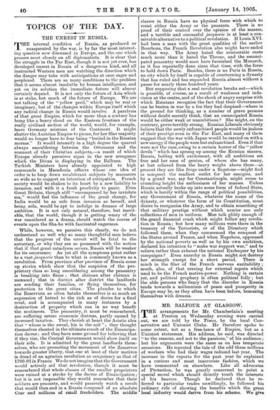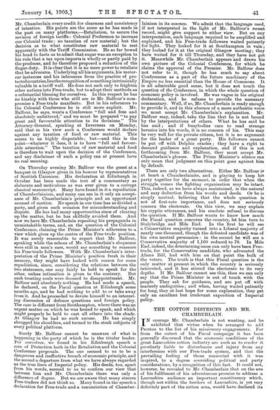Mr. Chamberlain every credit for dearness and consistency of intention.
His points are the same as he has made in the past on many platforms,—Retaliation, to secure the revision of foreign tariffs : Colonial Preference to increase our Colonial trade : no taxation of raw material ; but the decision as to what constitutes raw material to rest apparently with the Tariff Commission. He so far bowed his head to facts as to admit that sugar was an exception to his rule that a tax upon imports is wholly or partly paid by the producer, and he therefore proposed a reduction of the Sugar-duty. It is clear that it is no mere power to retaliate that he advocates. Underlying all his arguments, his motor- car instances and his inferences from the practice of pro- tected countrieslies the recognition of something intrinsically valuable in a tariff wall. He does not seek only to frighten other nations into Free-trade, but to adopt their methods as a substantial blessing for ourselves. In this respect he has no kinship with those who, still see in Mr. Balfour's com- promise a Free-trade manifesto. But in his references to the Colonial Conference he is still more explicit. Mr. Balfour, he says, wants a Conference "full and free and absolutely unfettered," and we must be prepared " to pay great and favourable attention to its decisions." The Attorney-General, speaking at Inverness on Monday, said that in his view such a, Conference would declare against any taxation of food or raw material. This seems to us highly disputable; but—and this is the point—whatever it does, it is to have "full and favour- able attention." The taxation of raw material and food is therefore to wait upon the decision of the Conference, and any disclaimer of such a policy can at present have no real meaning.
On Thursday evening Mr. Balfour was the guest at a banquet in Glasgow given in his honour by representatives of Scottish Unionism. His declaration at Edinburgh in October has been made the text of a commentary as elaborate and meticulous as was ever given to a corrupt classical manuscript. Many have found in it a repudiation of Chamberlainism, and many can see in it only an accept- ance of Mr. Chamberlain's principle and an opportunist counsel of caution. No speech in our time has so divided a party, and given such occasion for misunderstanding and dispute. He has had many opportunities since of clearing up the matter, but he has skilfully avoided them. And now we have Mr. Chamberlain repeating his propaganda in unmistakable terms, and, on the question of the Colonial Conference, claiming the Prime Minister's adherence to a view which gives up the centre of the Free-trade position. It was surely reasonable to expect that Mr. Balfour, speaking while the echoes of Mr. Chamberlain's eloquence were still in men's ears, would say something to reassure his Free-trade followers. With Mr. Chamberlain's inter- pretation of the Prime Minister's position fresh in their memory, they might have looked with reason for some repudiation, since, considering the relations between the two statesmen, one may fairly be held to speak for the other, unless intimation is given to the contrary. But such trusting souls were doomed to disappointment. Mr. Balfour said absolutely nothing. He had made a speech, he declared, on the Fiscal question at Edinburgh some months ago, and he had nothing to add to or take away from it. And he proceeded to devote himself to an interest- ing discussion of defence questions and foreign policy. The case is different from Southampton, where there was an urgent matter on which he was bound to speak, and which might properly be held to cast all others into the shade. At Glasgow he had no such excuse. He has simply shrugged his shoulders, and turned to the stock subjects of every political platform.
Surely Mr. Balfour cannot be unaware of what is happening in the party of which he is the titular leader. For ourselves, we found in his Edinburgh speech a core of Protection both in the Retaliation and the Colonial Conference proposals. The one seemed to us to be a dangerous and ineffective breach of economic principle, and the second a departure from what we have always regarded as the true lines of Imperial policy. His deeds, too, apart from his words, seemed to us to confirm our view that between him and Mr. Chamberlain there was only a difference of degree. But we are aware that many sincere Free-traders did not think so. Many found in the speech a declaration for Free-trade and a renunciation of Chamber- lainism in its essence. We admit that the language used, if not interpreted in the light of Mr. Balfour's recent record, might give support to either view. But on any interpretation, such language required to be amplified and explained, and his Free-trade followers waited patiently for light. They looked for it at Southampton in vain ; they looked for it at the original Glasgow meeting ; they have waited for it till Thursday, and they have not got it. Meanwhile Mr. Chamberlain appears and draws his own picture of the Colonial Conference, for which he claims the approval of the Premier. Mr. Balfour does not refer to it, though he has much to say about Conferences as a part of the future machinery of the Empire no less essential than the House of Commons. It is all admirable good sense, but it does not touch the question of the Conference, in which the whole question of economic policy is involved. He was vague in his original declaration, and he refuses to provide the necessary commentary. Well, if so, Mr. Chamberlain is ready enough to provide it, and in this absence of a more authentic voice we must accept Mr. Chamberlain's explanation. Mr. Balfour may, indeed, take the line that he is not bound by the interpretations of others. What he has said he has said ; and if busybodies care to read strange heresies into his words, it is no concern of his. This may be very well for the private citizen, but it is no argument for the leader of a great party. His followers cannot be put off with Delphic oracles ; they have a right to demand guidance and explanation, and if this is not forthcoming from Mr. Balfour, they must accept Mr. Chamberlain's glosses. The Prime Minister's silence can only mean that judgment on this point goes against him by -default.
There are only two alternatives. Either Mr. Balfour is at heart a Chamberlainite, and is playing to keep his party together for the moment, in order that when the struggle comes the fighting organisation may be intact. This, indeed, as we have always maintained, is the natural and easy deduction from his words and deeds. Or he is simply neutral, believing that the whole question is not of first-rate importance, and does not seriously concern the electorate. On this view, we may explain his cryptic utterances, and his resolute refusal to discuss the question. If Mr. Balfour wants to know how much the Fiscal question concerns the country, let him turn to Stalybridge and Mile End. In the first he will see a Conservative majority turned into a Liberal majority of nearly one thousand, though the defeated candidate was of his own neutral persuasion : in the second he will see a Conservative majority of 1,160 reduced to 78. In Mile End, indeed, the determining issue can only have been Free- trade, for the Conservative candidate, who advocated the Aliens Bill, had with him on that point the bulk of the voters. The truth is that this Fiscal question is the only matter at present in which the country is seriously interested, and it has stirred the electorate to its very depths. If Mr. Balfour cannot see this, then we can only say that the Prime Minister is out of touch with the people. They ask for guidance, and are put off with masterly ambiguities; and when, having waited patiently for long, they at last hope for some explanation, they get only an excellent but irrelevant exposition of Imperial policy.







































 Previous page
Previous page